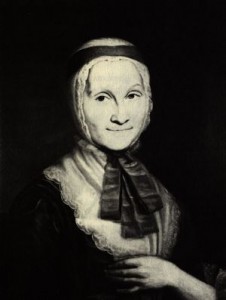Erdmuthe Dorothea, Countess von Zinzendorf
(Translated from German)
Good daughter, wife-suffering, faith strong poet, at times single, large Mother, financial manager, Mission travelers, chaplain – all that one can say of Erdmuthe Dorothea von Zinzendorf, the first Gutsverwalterin and house mother in Herrnhut.
After initially cool reserve is Komtess Erdmuthe of Reuss, the fifth child of Count Henry of Reuss and his wife Erdmuthe Benigna, 7 September 1722 Count Nicholas Ludwig von Zinzendorf in his parents’ castle chapel Ebersdorf said yes. The count, 21 years as herself, is a man with perfect manners, inspiring, spirited – and pious.She has no idea on what adventure she enters into marriage with the uncomfortable, ingenious and sometimes bizarre Nikolaus Ludwig von Zinzendorf.
He had actually stopped for a fix out to Erdmuthe hand. For the woman of his dreams to him his best friend, Heinrich von Reuss had Erdmuthe brother preferred.With the deeply devout will Erdmuthe young man a “fighter lead-marriage” in which it should not be about personal happiness, but to work together for the cause of God.
The loose and immoral life of the court at the Dresden court of Augustus the Strong, the well-bred daughter of the house of Reuss for religious reasons is just as averse as the Count, who has reluctantly accepted an unpaid position as a counselor with the state government.Zinzendorf Originally from the high nobility, but by no means rich.
Three months after the wedding the couple on their way to Zinzendorf’s just good Berthelsdorf acquired a fateful encounter: are there with permission from the fact established Moravian exiles. The refugees belong to the ancient Church of the Brethren in the tradition of Jan Hus and, through the Counter-Reformation became homeless.The Count pair allowed to remain Protestant religious refugees. “Herrnhut”: Under the care of the Lord, they shall give their fast-growing settlement. In overcoming all state and denominational boundaries Nikolaus von Zinzendorf founded the “Brethren,” a “Republic of God” to Herrnhut. What this means for the count, to be a brother among brothers – an idea for him to explain his peers to be mad. And with the “Erdmuth,” as it is called in the family, find it much more difficult than it at first.
Following the example of Christian community you live together in Herrnhut. There are houses for families and shared in each case for unmarried men and women.Erdmuthe head is in the house of women. Your management task that has already worked towards equality for women, revolutionary at the time.
The establishment and continuation of the now highly controversial community has to live able and wise Countess decisive role. From the meager income from property they must Berthelsdorf an orphanage along with more new guests and housemates entertained. Because the count has no relationship to the money, leaving her the complicated economic and financial management of property and community.
Soon there are also political problems: When the Habsburg government in August the strong against the years of clandestine migration of religious refugees action lodges, as the Elector Count of the country in 1732 and ordered him to sell his goods. Zinzendorf sold to Erdmuth, but may return late 1733rd Three years later he was banned again but because of his activities from Saxony. He travels through Europe as a preacher and even – in the course of the missionary movement initiated by him – to America.
After a long separation, living apart
Many new bases of the Brethren arise during his eleven-year exile in England, where he spent nearly five years.Erdmuthe oscillates between Herrnhut and changing residences outside national borders. Added arduous journeys come to Denmark in terms of Brethren, Livonia, and Russia. From Herrnhut makes them still a thriving, beautiful artisan village. As chaplain, it is a sought-after listener and counselor.
Twelve children they bring into the world, not eight of whom survived early childhood. Their suffering and yet unshakable confidence attitude reflected in the texts of numerous songs, some of which are sung to this day.
After the death of her only surviving son Renatus 1752 in England and one caused by Count von Zinzendorf Erdmuthe financial crisis is sick and increasingly weak. The long separation of the spouses has left its mark: When the count in 1755 and returning from London, have both lived so apart that Zinzendorf moved with his followers from London to the castle after Berthelsdorf. Erdmuthe remains in Herrnhut.
On 19 June 1756 she died. For her grave stone designs her husband, who feels that he is its still a lot of guilty, later the inscription: “… a princess of God among us and” infant-nurse of Brethren Church.
Karin Vorländer
Poems/Spiritual Songs by Countess Zinzindorf (This website is in German, some browsers will translate for you.)


Leave a Reply to Admin Cancel reply